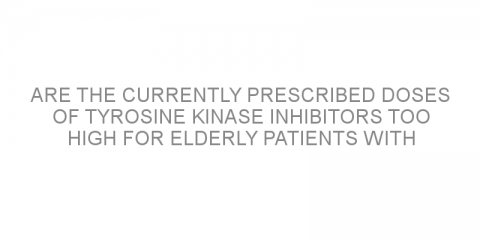In a nutshell This study reviewed treatment options for advanced phase chronic myeloid leukemia. This study concluded that managing advanced phase chronic myeloid leukemia remains challenging and treatment options include tyrosine kinase inhibitors, chemotherapy, and transplant. Some background Chronic myeloid leukemia (CML) can be...
Read MoreLeukemia Posts on Medivizor
Comparing new-generation tyrosine kinase inhibitors and imatinib in patients with newly diagnosed chronic myeloid leukemia
In a nutshell This study aimed to compare the effectiveness of new-generation tyrosine kinase inhibitors and imatinib in patients with newly diagnosed chronic myeloid leukemia. This study concluded that for first-line treatment, new-generation tyrosine kinase inhibitors are better than imatinib. Some background Tyrosine...
Read MoreSearching for patients with relapsed or unresponsive chronic lymphocytic leukemia to test an immune cell-stimulating treatment
In a nutshell This study is looking for patients with relapsed or unresponsive chronic lymphocytic leukemia (CLL) or small lymphocytic lymphoma (SLL) to test IOV-2001, a treatment that boosts cancer-killing immune cells. The main outcome that will be measured is how well patients respond to treatment. This study is recruiting in Columbus, OH,...
Read MoreAre the currently prescribed doses of tyrosine kinase inhibitors too high for elderly patients with chronic myeloid leukemia?
In a nutshell This study investigated the prescribed doses of tyrosine kinase inhibitors (TKIs) and the outcomes of elderly patients with chronic myeloid leukemia (CML). The study concluded that the currently prescribed TKI dose might be higher than necessary in elderly patients. Some background TKIs such as imatinib (Glivec), dasatinib...
Read MoreEvaluating blood or marrow transplantation with post-transplant cyclophosphamide in chronic lymphocytic leukemia
In a nutshell This study aimed to investigate the effect of post-transplant cyclophosphamide on allogeneic blood or marrow transplant in patients with chronic lymphocytic leukemia. This study concluded that this treatment approach is safe and effective for these patients. Some background Allogeneic blood or...
Read MoreMinimal residual disease response leading to better outcomes for patients with relapsed/refractory acute lymphoblastic leukemia after treatment with blinatumomab
In a nutshell This study aimed to evaluate the relationship between minimal residual disease response and outcomes in patients with relapsed/unresponsive B-cell precursor acute lymphoblastic leukemia who were treated with blinatumomab. This study concluded that achieving minimal residual disease response leads to better outcomes for...
Read MoreMy Oncologist Doesn’t Believe Food Is Necessary
By Steve Gillman What my cancer taught me about medical “evidence” and how much is enough I exaggerate. My oncologist probably does believe humans need food, but I suspect the belief makes him uncomfortable, since no double-blind studies have been done to prove it. Like many doctors, his general approach to treatment is that if something hasn’t been...
Read MoreLong-term safety and effectiveness of ibrutinib in patients with chronic lymphocytic leukemia
In a nutshell This study aimed to investigate if first-line ibrutinib treatment was safe and effective in the long-term for patients with chronic lymphocytic leukemia. This study concluded that single-agent ibrutinib provided good outcomes for patients when compared to the standard treatment chlorambucil in...
Read MoreEvaluating measurable residual disease at myeloablative allogenic transplantation in patients with acute lymphoblastic leukemia
In a nutshell This study aimed to investigate if measurable residual disease (MRD) before transplant in patients with acute lymphoblastic leukemia (ALL) is associated with different outcomes in patients undergoing myeloablative total body irradiation (TBI)-based and chemotherapy (CT)-based conditioning. This study concluded that...
Read MoreOutcomes for patients with acute myeloid leukemia who receive ex vivo T cell-depleted hematopoietic stem cell transplantation
In a nutshell This study aimed to investigate the outcomes of patients with acute myeloid leukemia after ex vivo T cell-depleted allogeneic hemopoietic stem cell transplant. This study concluded that the outcomes for these patients compare favorably to an unmodified transplant and that the modified transplant leads to lower rates of...
Read MoreBlinatumomab compared to standard of care treatment for patients with acute lymphoblastic leukemia
In a nutshell This study aimed to compare outcomes of blinatumomab treatment and standard of care treatment for patients with relapsed/unresponsive Philadelphia chromosome-positive acute lymphoblastic leukemia. This study concluded that blinatumomab is a more suitable treatment for these patients than standard of care...
Read MoreWhat factors can predict the success of stem cell transplantation?
In a nutshell This study evaluated the risk factors associated with delayed engraftment (DE) in patients who had stem cell transplantation (SCT). The authors found that patients receiving blood transfusions, those with low platelet levels, and those given low numbers of stem cells during SCT were more likely to experience DE. Some background...
Read More











